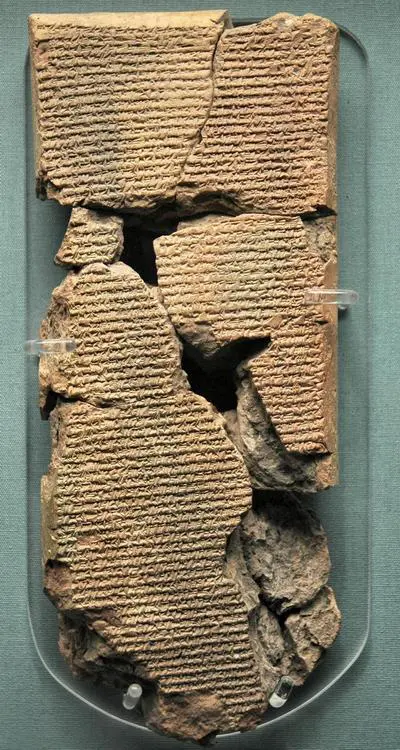Ἱστορίαι Ἡροδότου — η’
Herodotus’ Histories — #8
May 2021
Fragment of a clay tablet, an account of the Egyptian campaigns of Ashurbanipal, King of Assyria (668-627 BC) and his reception of an embassy from Gyges from the British Museum.

The story of Candaules, his wife and a bodyguard of his (Gyges) is very famous and well known. Candaules, thinking his wife to be the most beautiful of all, wants to show his most loyal bodyguard her naked body, so that he’ll believe him.
Οὗτως δὴ ὦν ὁ Κανδαύλης ἠράσθη τῆς ἑωυτοῦ γυναικός, ἐρασθεὶς δὲ ἐνόμιζέ οἱ εἶναι γυναῖκα πολλὸν πασέων καλλίστην. ὥστε δὲ ταῦτα νομίζων, ἦν γάρ οἱ τῶν αἰχμοφόρων Γύγης ὁ Δασκύλου ἀρεσκόμενος μάλιστα, τούτῳ τῷ Γύγῃ καὶ τὰ σπουδαιέστερα τῶν πρηγμάτων ὑπερετίθετο ὁ Κανδαύλης καὶ δὴ καὶ τὸ εἶδος τῆς γυναικὸς ὑπερεπαινέων.
χρόνου δὲ οὐ πολλοῦ διελθόντος — χρῆν γὰρ Κανδαύλῃ γενέσθαι κακῶς — ἔλεγε πρὸς τὸν Γύγην τοιάδε. “Γύγη, οὐ γὰρ σε δοκέω πείθεσθαι μοι λέγοντι περὶ τοῦ εἴδεος τῆς γυναικός — ὦτα γὰρ τυγχάνει ἀνθρώποισι ἐόντα ἀπιστότερα ὀφθαλμῶν — ποίεε ὅκως ἐκείνην θεήσεαι γυμνήν.”
ὃ δʼ ἀμβώσας εἶπε “δέσποτα, τίνα λέγεις λόγον οὐκ ὑγιέα, κελεύων με δέσποιναν τὴν ἐμὴν θεήσασθαι γυμνήν; ἅμα δὲ κιθῶνι ἐκδυομένῳ συνεκδύεται καὶ τὴν αἰδῶ γυνή.πάλαι δὲ τὰ καλὰ ἀνθρώποισι ἐξεύρηται, ἐκ τῶν μανθάνειν δεῖ· ἐν τοῖσι ἓν τόδε ἐστί, σκοπέειν τινὰ τὰ ἑωυτοῦ. ἐγὼ δὲ πείθομαι ἐκείνην εἶναι πασέων γυναικῶν καλλίστην, καὶ σέο δέομαι μὴ δέεσθαι ἀνόμων.”
Houtos dē ōn ho Kandaulēs ērasthē tēs heōutou gynaikos, erastheis de enomize hoi einai gynaika pollon paseōn kallistēn. hōste de tauta nomizōn, ēn gar hoi tōn aichmophorōn Gygēs ho Daskylou areskomenos malista, toutō tō Gygē kai ta spoudaiestera tōn prēgmatōn hyperetitheto ho Kandaulēs kai dē kai to eidos tēs gynaikos hyperepaineōn.
chronou de ou pollou dielthontos — chrēn gar Kandaulē genesthai kakōs — elege pros ton Gygēn toiade. Gygē, ou gar se dokeō peithesthai moi legonti peri tou eideos tēs gynaikos — ōta gar tynchanei anthrōpoisi eonta apistotera ophthalmōn —, poiee hokōs ekeinēn theēseai gymnēn.
ho dʼ ambōsas eipe despota, tina legeis logon ouk hygiea, keleuōn me despoinan tēn emēn theēsasthai gymnēn? hama de kithōni ekdyomenō synekdyetai kai tēn aidō gynē. palai de ta kala anthrōpoisi exeurētai, ek tōn manthanein dei; en toisi hen tode esti, skopeein tina ta heōutou. egō de peithomai ekeinēn einai paseōn gynaikōn kallistēn, kai seo deomai mē deesthai anomōn.
Candaules loved his own wife; he fell in love with her so much, in fact, that he considered her to be the most beautiful of all. As he believed this, he greatly praised her beauty even to Gyges (son) of Dascylus, who was the bodyguard he was most satisfied with; so much so that he entrusted him even with the most serious and important matters.
After not too much time had passed — and something bad was bound to happen to him (at some point) — he said to Gyges the following, Gyges, I do not believe you trust what I say about the beauty of my wife — for, indeed, that which people hear appear to them less trustworthy than what they see —, so let us have it arranged that you shall see her naked.
Protesting loudly at this, he said, Master, why do you say such unclean things by ordering me to see the mistress naked? At the same time that a woman removes her robes, she also removes her modesty. Long ago, certain things were found out by noble men from which one must learn; one of these is to mind your own business. I, for one, believe your saying that she is the most beautiful of women and I implore you not to make me do lawless things.